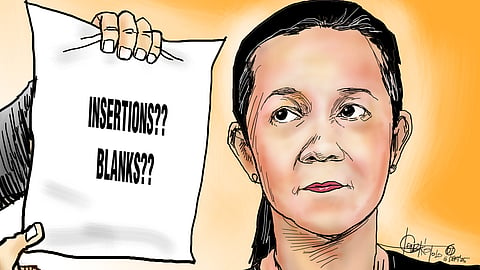
- NEWS
- the EDIT
- COMMENTARY
- BUSINESS
- LIFE
- SHOW
- ACTION
- GLOBAL GOALS
- SNAPS
- DYARYO TIRADA
- MORE

What would it take for Congress to come clean about the pork barrel projects that lawmakers have long been using to siphon off hundreds of billions of pesos each year from the national budget?
The question that pervades the public’s mind is how greed has become a standard part of the budgeting process and why it is being allowed to persist.
A comprehensive explanation is needed, particularly for how these pet projects were inserted into the General Appropriations Act. A good starting point would be last year’s budget, widely regarded as the most corrupt in recent memory.
The cleansing should start with the questioning of the heads of the bicameral conference committee then, who were Rep. Zaldy Co for the House and then senator Grace Poe for the Senate.
Since Co appears to have fled to America, it is incumbent upon Poe to lay down her cards.
According to former Public Works and Highways Secretary Manuel Bonoan, a budget of P900 billion was originally proposed for the Department of Public Works and Highways (DPWH) in the 2025 National Expenditure Program (NEP), but in the final bicameral conference committee report, the outlay had been increased to P1.088 trillion.
Thus, for the DPWH budget alone, Poe needs to shed light on the P200 billion in insertions, including the P142.7 billion added during the final deliberations on the General Appropriations Bill allegedly by Senate President Chiz Escudero, before the bill was submitted to the President.
That was the time Davao City Rep. Sid Ungab suspected the blank items in the bicam report were filled in.
The projects added to the final version of the GAB were blatantly pork in nature, as they were split into “phases,” “packages,” or “segments” that overlapped in scope and location.
Poe had defended the increase in the DPWH’s 2025 budget, saying there were foreign-assisted projects that needed government funding.
Her reasoning, however, contradicted the approach taken, as a handful of such projects funded through Official Development Assistance (ODA) were relegated to the Unprogrammed Appropriations (UA) in the bicam report, which were not counted as part of the budget.
Under the Constitution, Congress cannot pass a budget bill higher than what is proposed in the NEP; however, the legislature is allowed to reallocate funds within the budget amount.
The UA included items that could only be implemented if additional funds were generated, either from excess revenue collections or borrowings.
In 2024, to cover the gap, the budget law carried a provision allowing the Department of Finance to sweep “excess funds” from state firms and financial institutions.
In the 2025 budget, the juggling led to the defunding of the Philippine Health Insurance Corp. (PhilHealth) of P74 billion, which reduced the access of poor Filipinos to health services.
House Deputy Speaker Ronnie Puno implicated Poe in the final deliberations on the 2025 budget but later apologized, clarifying that she was not part of the crucial discussions.
Thus, the ball is now in Poe’s court since, as head of the Senate bicam panel, she was responsible for what transpired in the now notorious body.
